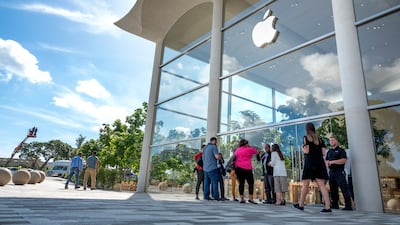Apple seems not to be keen to jump on to the metaverse bandwagon despite several other technology companies preparing for what is being touted as the next iteration of the internet, one of its top executives said.
The metaverse is “a word I will never use”, Greg Joswiak, Apple's senior vice president for worldwide marketing, said at the Wall Street Journal's Tech Live event on Tuesday.
While Mr Joswiak did not elaborate, there is a precedent for Apple's apparent non-interest in the metaverse.
During a conference call on its 2021 financial results in January, chief executive Tim Cook declined to use the word “metaverse” in response to a question from a Morgan Stanley analyst on the technology.
Instead, he touted the Cupertino, California-based company's focus and efforts on augmented reality and said that the company was “investing accordingly” as it recognised “a lot of potential in this space”.
At the time, Apple had more than 14,000 apps for its ARkit developer tool.
“That is a big question [on the metaverse]. But we are a company in the business of innovation. So, we are always exploring new and emerging technologies. You have spoken at length about how this area is very interesting to us,” Mr Cook said at the time.
Mr Cook has never commented on the metaverse since.
The metaverse is the virtual space where people, represented by avatars or three-dimensional representations, can interact.
It is being highly promoted by Mark Zuckerberg, the chief executive of Meta Platforms, the company formerly known as Facebook. The name change, as well as the billions of dollars Mr Zuckerberg has poured into the technology, show his company's seriousness in pushing the innovation.
But critics have argued that it is too early for the metaverse to go mainstream owing to a lack of standards and regulations.
Mr Zuckerberg himself has been the subject of criticism. In August, he received backlash for the Horizon World VR sandbox, the graphics of which were a far cry from his initial pitch last year.
On Wednesday, Meta reported a 52 per cent plunge in its third-quarter net profit, with revenue at its Reality Labs business — the unit responsible for bringing Mr Zuckerberg's metaverse plans to life — sliding 49 per cent.
This resulted in investors, who are losing their patience over his metaverse plans, punishing the company by dumping stock, resulting in a 20 per cent decline in its share price that wiped off about $67 billion from its market value.
The technology is poised to reshape the workplace by creating immersive ways of team collaboration, hastening the learning of new skills through virtualisation and the eventual rise of a metaverse economy with new enterprises and work roles, according to the Harvard Business Review.
It is also an economic opportunity worth between $8 trillion and $13tn, heavily dependent on how much companies are willing to invest in the emerging innovation, said consultancy PwC.
Apple's cold sentiment towards the metaverse followed a similar tone made earlier at the event by Evan Spiegel, the chief executive of Snapchat parent Snap — and he was even more candid.
The metaverse is “living inside a computer”, he said. “The last thing I want to do when I get home from work during a long day is live inside a computer.”
Mr Spiegel said there was a “clear fork in the road” on how companies would go about dealing with future technology.
There are those who want people to be immersed further into alternative realities, he said, which is in contrast to what Snapchat is focused on — coming up with technology that people can “get out of the way”.
“We just talk to so many people that feel like computing or even their phones [are] getting in the way of [them] enjoying the world around them. They really enjoy reality and feel like computing puts a lot of friction in the way,” he said.
“The promise of augmented reality is giving you all the benefits of computing without a lot of that friction.”
Meanwhile, Mr Joswiak said at the event that Apple would comply with the EU's regulation of standardising the use of USB-C ports on devices but did not give any specific time frame.
“You have probably heard me say for years that I don't mind governments telling us what they want to accomplish. But usually, we have got some pretty smart engineers to figure out the best ways to accomplish them technically,” he said.
The EU parliament earlier this month passed a law on standardising USB-C chargers, a move that is expected to affect Apple more than its rivals.
chief executive of Snap
It has long been rumoured that Apple was planning to switch to the USB-C ports. However, with the EU's decision, this will most probably happen next year with the release of the iPhone 15.
Mr Joswiak acknowledged that Apple and the EU had been “in an argument” for more than a decade over the issue and said that he thought at one point that the micro-USB port, whose presence is diminishing, would be used.
He also argued that by standardising the USB-C port, billions of Lightning cables — Apple's proprietary port — would be rendered useless and would cause “a bunch of e-waste”.
“Obviously, we will have to comply. We have no choice as we do around the world to comply with local laws, but we think the approach would have been better environmentally and better for our customers to not have a government be that prescriptive,” he said.
Apple was also tight-lipped when asked about the possibility of having touchscreens on its Mac line of computers, which, if introduced, would become a standard on all the company's devices.
“I'm good with that,” said Craig Federighi, Apple's senior vice president of software engineering.












